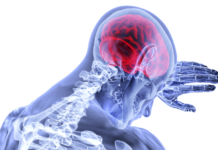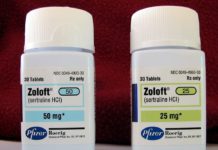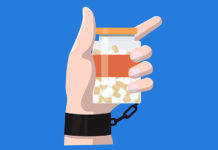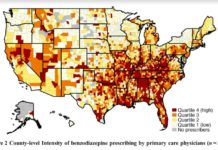New Study Investigates Cannabidiol (CBD) for Psychosis
A new study examines the effects of CBD as an adjunct therapy to antipsychotic medication for patients diagnosed with schizophrenia.
New Study Finds Limited Effectiveness for Antidepressants After Stroke
The researchers found that although antidepressants had a slight short-term effect on reducing the likelihood of depression diagnosis, there was no long-term improvement, nor any improvement in motor functioning.
The War on Antidepressants: Why We Need to End it for Public Benefit
In the interest of the patients who are currently experiencing withdrawal reactions and the many more who will suffer withdrawal effects in the future, we need to end this “war.” Academic psychiatry must address these problems and conduct thorough research on withdrawal reactions.
Opioids May Cause Depression and Worsen Chronic Pain
“Converging lines of evidence now suggest that depression—a common comorbidity in the setting of chronic pain—may in some patients represent an unrecognized yet potentially reversible harm of opioid therapy.”
How Long Does Antidepressant Withdrawal Last?
The patient experiencing the pain of withdrawal believed that they would feel better when they stopped taking their antidepressants. After all, they’re under the care of a board-certified medical professional who has vowed to do no harm. But despite those reassurances, they find themselves in a world of hurt.
Researchers Challenge Interpretation of Antidepressant Meta-analysis
Researchers question the overstated results of a large antidepressant meta-analysis and point to cultural pressures to turn to these drugs for a quick fix.
Treatment Guidelines Should Not Be Written by Professional Societies and Insiders
John Ioannidis, a leading expert on research methods, takes a critical look at the way professional societies write treatment guidelines.
Polypharmacy Associated with Cognitive Decline in Elderly Patients
Study finds that elderly patients taking at least 5 medications were at increased risk of mild cognitive impairment and dementia.
Better Outcomes Off Medication for Those Recovered from First-Episode Schizophrenia
A new study has found that of 10 people who were fully recovered from their first episode of schizophrenia (FES), those not taking antipsychotics did better in terms of cognitive, social, and role functioning—and reached full recovery more quickly.
Antidepressant Withdrawal: An Unknown Disorder?
Antidepressant withdrawal is no longer an unknown disorder since knowledge on this topic has grown enough to be translated into practice. As proposed by George Engel in 1977, medical doctors, including psychiatrists, can observe and listen to their patients and develop a program to treat withdrawal and restore health.
Flexible Treatment Planning Improves Depression Outcomes in Youth
Researchers explore the effects of augmented treatment at various points in interpersonal psychotherapy for adolescents diagnosed with depression, highlighting previously unidentified critical decision points (i.e., relatively early in the treatment sequence).
Prenatal Valproate Exposure Linked with ADHD Diagnosis in Children
Children who were exposed to anti-seizure drug valproate in utero were 48% more likely to develop ADHD, according to a new study.
Study Links Antidepressants and Decreased Coping Behaviors Across Generations
Biologists found that exposure to antidepressants suppresses important survival behaviors in zebrafish, an effect that persisted across three generations and was found to be more severe for males.
The Good, the Bad, and the Ugly: An Infographic on Bipolar Drugs
Bipolar drug therapy is a balancing act of benefits vs. harms. Odds of attributable benefit cluster in a 15-25% band, so 75%-85% don’t see substantial benefit. Stated differently, if five people take a bipolar drug, only one is likely to see substantial improvement due to it, but all five will have side effects.
Tumbling Further Down the Rabbit Hole of Antidepressant Withdrawal Research
One of the criticisms of our systematic review was that it failed to include five randomised control trials. Here we will show how groundless this is, and thus gain insight into how shadowy and ethically suspect antidepressant withdrawal research can get when viewed up close.
Researchers Push Back Against Recommendation to Combine Antidepressants for Suicide Prevention
Researchers challenge the recommendation of starting two antidepressants simultaneously to increase preventative effects against suicide.
Antipsychotics Associated with High Risk of Death in Children
A new study has found that children and adolescents taking a high dose of antipsychotics are almost twice as likely to die of any cause than children on other types of medications.
Claims That Long-term Antipsychotic Use Leads to Better Outcomes are Misleading, Researchers Argue
Researchers reveal the limitations and misleading interpretations of two recent studies that claim to demonstrate that long-term antipsychotic use leads to better outcomes.
Antidepressant Dependence Discussed at the Seat of Welsh Government – Video
In parts of Wales in the UK, one in six adults takes antidepressants and support for anyone struggling with dependence or withdrawal issues is patchy and inconsistent. To help draw attention to these issues, an awareness day was arranged for the Welsh Government and here we provide video of the presentations made at the Senedd in Cardiff, Wales.
Growing Evidence for the Link Between ADHD Diagnosis and Age at School Admission
Researchers detect a striking relationship between the month of school enrollment relative to peers and patterns of ADHD diagnoses in a large sample of elementary school students throughout the US.
Researchers Ask, ‘Why Do Antidepressants Stop Working?’
An international group of researchers, including several with financial ties to manufacturers of antidepressants, explore possible explanations for why long-term users of antidepressants become chronically depressed.
MIA Survey: Ex-patients Tell of Force, Trauma and Sexual Abuse in America’s Mental Hospitals
In a MIA survey of people who had been patients in mental hospitals, nearly 500 respondents told of an experience that was often traumatic, and frequently characterized by a violation of their legal rights, forced treatment with drugs, and physical or sexual abuse. Only 17% said they were “satisfied” with the “quality of the psychiatric treatment” they received.
Increased Suicidality in Cymbalta Trial for Fibromyalgia in Teens
A new as-yet-unpublished trial of duloxetine (Cymbalta) for fibromyalgia has presented more evidence of suicidal events in teens.
Benzodiazepine Prescriptions in Older Adults Used in Rural and Low Income Areas
Benzodiazepine prescription practices may be in response to an epidemic of distress, rather than being used to treat specific mental health diagnoses.
Prazosin Ineffective for Preventing Suicidal Thoughts — May Worsen Nightmares
A new study found that prazosin was associated with increased insomnia and nightmares, and did not reduce suicidal thoughts.

































